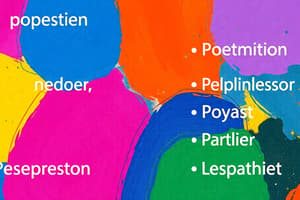Podcast
Questions and Answers
Which preposition is used to indicate the purpose of an action?
Which preposition is used to indicate the purpose of an action?
- Con
- A
- Sin
- Para (correct)
What is the translation of the preposition 'Entre'?
What is the translation of the preposition 'Entre'?
- With
- Between/Among (correct)
- Before
- For
Which sentence would use the preposition 'Antes'?
Which sentence would use the preposition 'Antes'?
- I love coffee with milk.
- The math class is before the science class. (correct)
- I'm meeting my friend at the park.
- I'm going to the store to buy milk.
What is the translation of the preposition 'Con'?
What is the translation of the preposition 'Con'?
Which preposition is used to indicate movement towards a place?
Which preposition is used to indicate movement towards a place?
What does the preposition 'Sin' typically indicate in a sentence?
What does the preposition 'Sin' typically indicate in a sentence?
In which sentence would the preposition 'A' be used?
In which sentence would the preposition 'A' be used?
What is the meaning of the sentence 'La clase de español es antes de la clase de inglés.'?
What is the meaning of the sentence 'La clase de español es antes de la clase de inglés.'?
In which sentence would the preposition 'Entre' be used?
In which sentence would the preposition 'Entre' be used?
What is the meaning of the sentence 'Me gusta el café con leche.'?
What is the meaning of the sentence 'Me gusta el café con leche.'?
Which preposition is used to indicate the start of a period of time?
Which preposition is used to indicate the start of a period of time?
Which sentence would use the preposition 'Bajo'?
Which sentence would use the preposition 'Bajo'?
What is the meaning of the sentence 'Según los expertos hay más contaminación que hace 10 años.'?
What is the meaning of the sentence 'Según los expertos hay más contaminación que hace 10 años.'?
Which preposition is used to indicate movement towards a specific place?
Which preposition is used to indicate movement towards a specific place?
What is the meaning of the sentence 'El libro es sobre la vida de Juan.'?
What is the meaning of the sentence 'El libro es sobre la vida de Juan.'?
I am going to travel through which region?
I am going to travel through which region?
What time will I finish my work?
What time will I finish my work?
When do I need to return?
When do I need to return?
What did I do last year?
What did I do last year?
Which preposition is used to indicate movement along a path or route?
Which preposition is used to indicate movement along a path or route?
Flashcards are hidden until you start studying
Study Notes
Prepositions in Spanish
- Con means "with" and is used to express accompaniment or association (e.g., Me gusta el café con leche - I like coffee with milk).
- Para means "for" or "in order to" and is used to express purpose or destination (e.g., Tengo que ir a la tienda para comprar azúcar - I have to go to the store to buy sugar).
- Sin means "without" and is used to express absence or lack (e.g., No se puede vivir sin comida - You can't live without food).
- Antes means "before" and is used to express time or order (e.g., La clase de español es antes de la clase de inglés - The Spanish class is before the English class).
- Entre means "between" or "among" and is used to express location or position (e.g., La oficina está entre el banco y el supermercado - The office is between the bank and the supermarket).
- A means "to" or "at" and is used to express movement or direction (e.g., Juan va a la playa - Juan goes to the beach).
Prepositions in Spanish
- Con means "with" and is used to express accompaniment or association (e.g., Me gusta el café con leche - I like coffee with milk).
- Para means "for" or "in order to" and is used to express purpose or destination (e.g., Tengo que ir a la tienda para comprar azúcar - I have to go to the store to buy sugar).
- Sin means "without" and is used to express absence or lack (e.g., No se puede vivir sin comida - You can't live without food).
- Antes means "before" and is used to express time or order (e.g., La clase de español es antes de la clase de inglés - The Spanish class is before the English class).
- Entre means "between" or "among" and is used to express location or position (e.g., La oficina está entre el banco y el supermercado - The office is between the bank and the supermarket).
- A means "to" or "at" and is used to express movement or direction (e.g., Juan va a la playa - Juan goes to the beach).
Prepositions in Spanish
Contra
- Means "against" and is used to indicate opposition or competition
- Example: "El equipo de España jugará contra el equipo de Inglaterra en la final" (The Spanish team will play against the English team in the final)
Desde
- Means "since" or "from" and is used to indicate a starting point in time
- Example: "La conozco desde hace once años" (I've known her for eleven years)
Durante
- Means "during" and is used to indicate a period of time
- Example: "Vivía en Granada durante tres meses" (I lived in Granada for three months)
Hacia
- Means "towards" and is used to indicate direction
- Example: "Viajamos hacia las montañas" (We're traveling towards the mountains)
Bajo
- Means "under" and is used to indicate a lower position or temperature
- Example: "La temperatura fue bajo diez grados" (The temperature was under ten degrees)
Según
- Means "according to" and is used to indicate a source of information
- Example: "Según los expertos hay más contaminación que hace 10 años" (According to the experts, there's more pollution than 10 years ago)
Sobre
- Means "about", "above", or "over" and is used to indicate a topic or a physical position
- Example: "El libro es sobre la vida de Juan" (The book is about Juan's life)
Prepositions in Spanish
- De is used to indicate origin or source, e.g., "Caminé el Camino de Santiago el año pasado" (I walked the Camino de Santiago last year).
Indicating Time
- Hasta is used to indicate "until" a specific time or point, e.g., "No voy a terminar mi trabajo hasta las once" (I won't finish my work until eleven o'clock).
Location and Movement
- En is used to indicate "in" or "on" a specific location, e.g., "Tengo que volver en dos minutos" (I have to return in two minutes).
Movement and Route
- Por is used to indicate "for", "by", or "through" when talking about movement or route, e.g., "Viajaré por Castilla La Mancha" (I will travel through Castilla La Mancha).
Studying That Suits You
Use AI to generate personalized quizzes and flashcards to suit your learning preferences.




